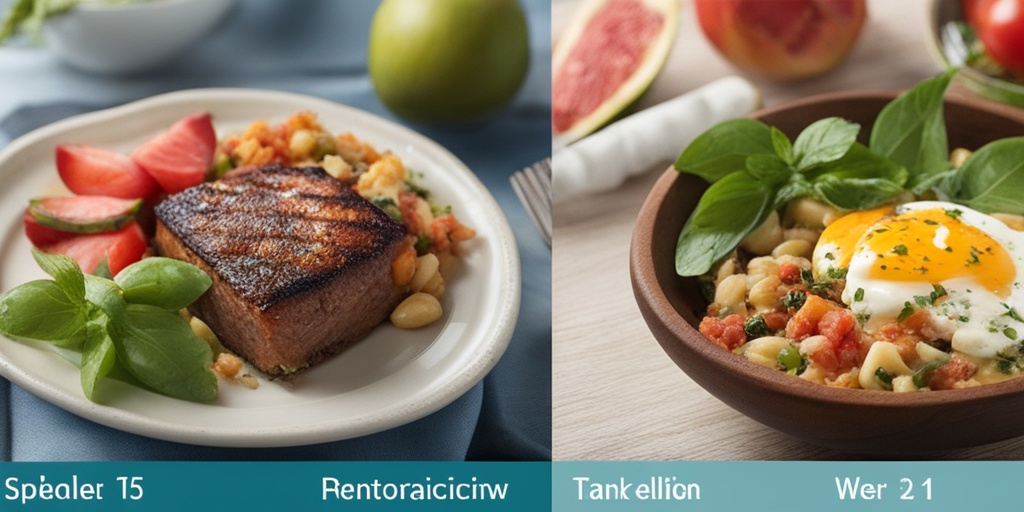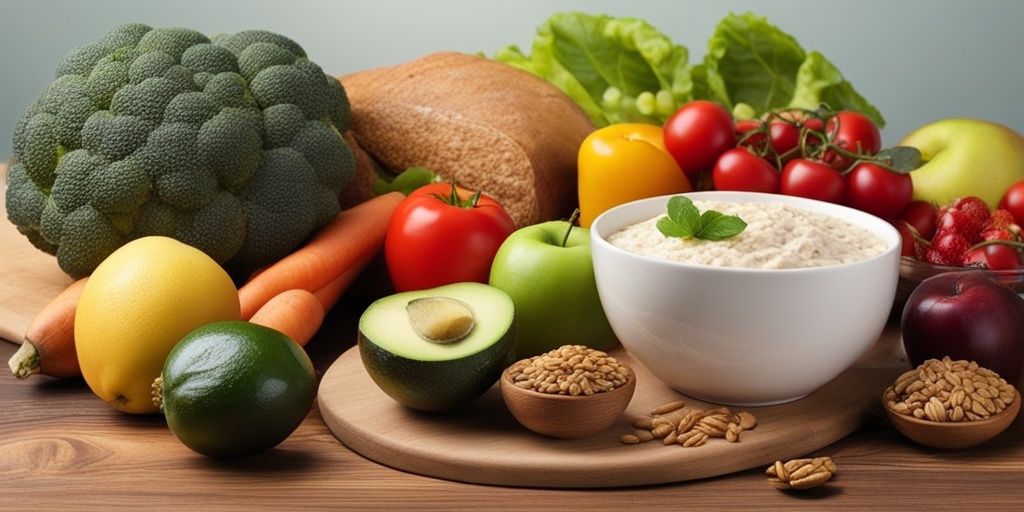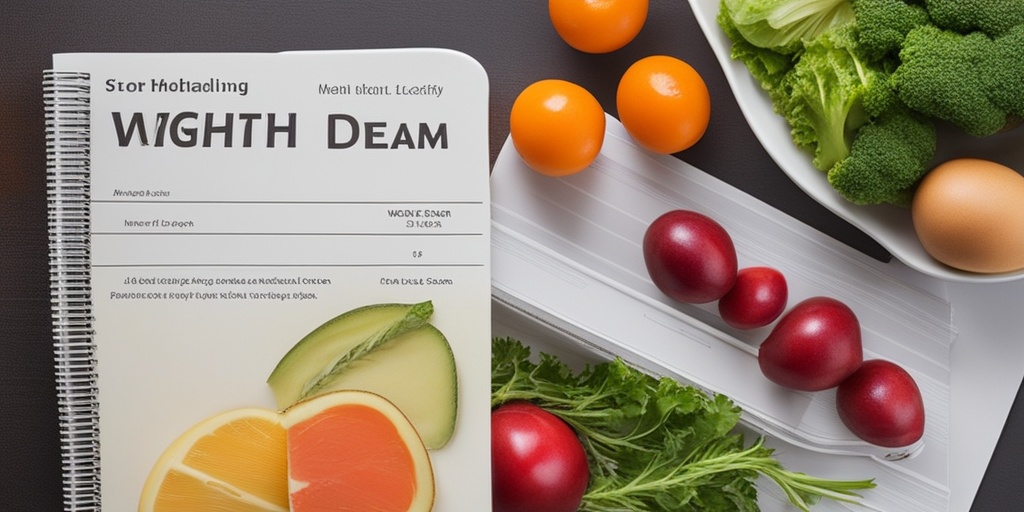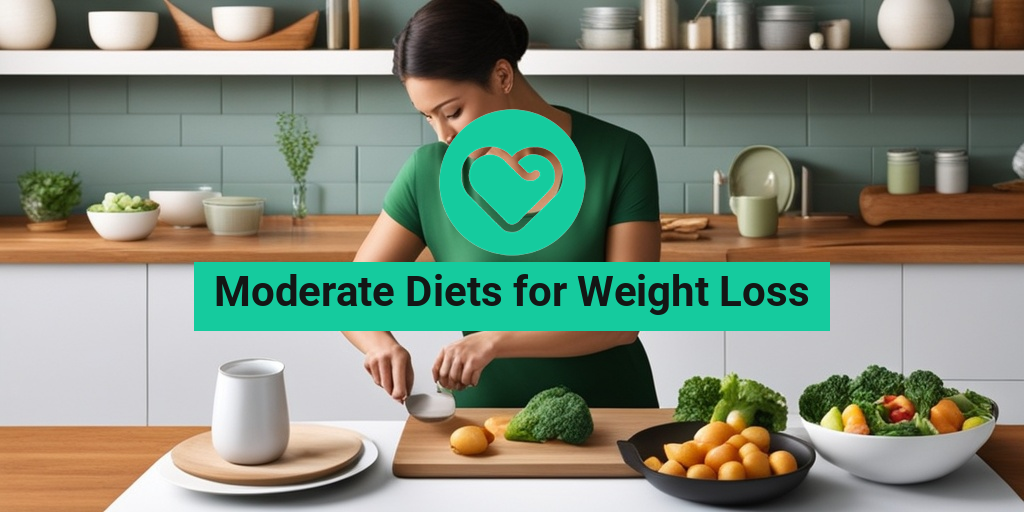What is a Moderate Diet for Weight Loss?
When it comes to weight loss, it’s easy to get caught up in the latest fad diets and extreme restrictions. However, the truth is that moderate diets for weight loss are often the most effective and sustainable approach. But what exactly does a moderate diet entail?
Defining Moderate Weight Loss
A moderate diet for weight loss is one that promotes a healthy and balanced approach to eating. It’s not about cutting out entire food groups or drastically reducing calorie intake, but rather making sustainable lifestyle changes that can be maintained in the long term. A moderate diet typically involves:
- Eating a balanced mix of protein, healthy fats, and complex carbohydrates
- Incorporating a variety of fruits, vegetables, whole grains, and lean protein sources
- Limiting processed and high-calorie foods, but not eliminating them entirely
- Aiming for a daily calorie deficit of 500-1000 calories to promote weight loss
This approach may not be as flashy as some of the more extreme diets out there, but it’s a tried-and-true method that has been shown to lead to sustainable weight loss and improved overall health.
Benefits of Moderate Diets for Weight Loss
So, why do moderate diets for weight loss stand out from the rest? Here are just a few of the benefits you can expect from this approach:
Sustainable Weight Loss
One of the biggest advantages of a moderate diet is that it promotes sustainable weight loss. By making gradual changes to your eating habits, you’re more likely to stick with the program and avoid the dreaded “yo-yo dieting” effect. This means you’ll be more likely to maintain your weight loss over time, rather than regaining it all (and then some!) once you stop dieting.
Improved Nutrient Intake
A moderate diet focuses on whole, nutrient-dense foods, which means you’ll be getting a balanced mix of vitamins, minerals, and antioxidants. This can lead to improved energy levels, better digestion, and even a reduced risk of chronic diseases like heart disease and diabetes.
Reduced Risk of Disordered Eating
Extreme diets can often lead to disordered eating habits, such as restrictive eating, bingeing, and purging. A moderate diet, on the other hand, promotes a healthy relationship with food and reduces the risk of developing these harmful habits.
Increased Flexibility and Enjoyment
Let’s face it: extreme diets can be boring and restrictive. A moderate diet, on the other hand, allows for flexibility and enjoyment. You can still indulge in your favorite treats from time to time, and you won’t feel guilty about it!
At Yesil Health AI (yesilhealth.com), we believe in providing evidence-based health answers that promote sustainable weight loss and overall wellness. By incorporating a moderate diet into your lifestyle, you’ll be well on your way to achieving your health goals and maintaining them for the long haul. 🏋️♀️💪

How to Create a Moderate Diet Plan for Weight Loss
When it comes to weight loss, it’s easy to get caught up in the latest fad diets and extreme restrictions. However, research has shown that moderate diets for weight loss are often the most effective and sustainable in the long run. But what does a moderate diet plan look like, and how can you create one that works for you?
Set Realistic Goals
The first step in creating a moderate diet plan is to set realistic goals. This means aiming to lose 1-2 pounds per week, rather than trying to lose 10 pounds in a month. This may seem slow, but it’s a much more sustainable pace that will help you maintain weight loss in the long run.
Focus on Addition, Not Subtraction
Rather than cutting out entire food groups or restricting yourself to a tiny list of “allowed” foods, focus on adding healthy foods to your diet. This could mean adding a serving of fruits or vegetables to each meal, or incorporating healthy fats like nuts and avocado into your snacks.
Make Sustainable Swaps
Another key aspect of a moderate diet plan is making sustainable swaps. This could mean switching from white bread to whole grain bread, or choosing lean protein sources like chicken or fish instead of processed meats. These small changes can add up to make a big difference in your overall diet.
Don’t Forget About Portion Control
Portion control is a crucial aspect of any diet plan, and a moderate diet is no exception. This doesn’t mean measuring out every bite or counting calories obsessively, but rather paying attention to your hunger and fullness cues and eating until you’re satisfied, rather than stuffed.
Foods to Eat on a Moderate Diet for Weight Loss
So, what foods should you be eating on a moderate diet for weight loss? The good news is that you don’t have to cut out entire food groups or restrict yourself to a tiny list of “allowed” foods. Instead, focus on incorporating a variety of whole, unprocessed foods into your diet.
Fruits and Vegetables
Fruits and vegetables are a crucial part of any healthy diet, and a moderate diet is no exception. Aim to include a variety of colors on your plate to ensure you’re getting a range of nutrients. Some great options include:
- Leafy greens like spinach and kale
- Brightly colored fruits like berries and citrus
- Crunchy vegetables like carrots and bell peppers
Lean Protein Sources
Lean protein sources are another important aspect of a moderate diet. These could include:
- Chicken and turkey breast
- Fish like salmon and tilapia
- Legumes like lentils and chickpeas
- Nuts and seeds like almonds and chia seeds
Whole Grains
Whole grains are a great source of fiber and nutrients, and can help keep you full and satisfied. Some great options include:
- Brown rice and quinoa
- Whole grain bread and pasta
- Oats and barley
Remember, the key to a successful moderate diet is to focus on addition, not subtraction. By incorporating a variety of whole, unprocessed foods into your diet, you’ll be well on your way to achieving your weight loss goals. 🥗

Foods to Avoid on a Moderate Diet for Weight Loss
When it comes to achieving weight loss on a moderate diet, it’s not just about what you eat, but also what you avoid. While it can be tempting to indulge in your favorite treats, certain foods can hinder your progress and make it harder to reach your goals. In this section, we’ll explore the foods to avoid on a moderate diet for weight loss.
Processed and Packaged Foods
Processed and packaged foods are often high in unhealthy fats, added sugars, and sodium. These foods can be detrimental to your weight loss efforts and overall health. Some examples of processed and packaged foods to avoid include:
- Baked goods, such as pastries and cakes
- Frozen meals, like pizza and TV dinners
- Boxed snacks, like chips and crackers
- Sugary drinks, like soda and sports drinks
Instead, opt for whole, unprocessed foods like fruits, vegetables, lean proteins, and whole grains. These foods are rich in nutrients and fiber, making them more filling and satisfying.
High-Fat Dairy Products
While dairy products can be a part of a healthy diet, high-fat dairy products can hinder weight loss efforts. Foods to avoid include:
- Full-fat cheese, like cheddar and brie
- Whole milk and cream
- Fatty yogurts, like flavored and sweetened varieties
Instead, choose low-fat or fat-free dairy products, like skim milk and low-fat yogurt.
Refined Carbohydrates
Refined carbohydrates, like white bread and sugary treats, can cause a spike in blood sugar and insulin levels, leading to weight gain. Foods to avoid include:
- White bread and pasta
- Sugary cereals and granola
- Baked goods, like muffins and cookies
Instead, opt for whole, complex carbohydrates like whole grains, fruits, and vegetables.
Sample Meal Plan for a Moderate Diet for Weight Loss
A moderate diet for weight loss focuses on balanced, nutrient-dense meals that promote feelings of fullness and satisfaction. Here’s a sample meal plan to get you started:
Breakfast
Monday: Oatmeal with banana and almond milk, topped with walnuts and a sprinkle of cinnamon
Tuesday: Greek yogurt with berries and a sprinkle of granola, paired with a hard-boiled egg
Lunch
Monday: Grilled chicken breast with roasted vegetables and quinoa
Tuesday: Whole grain pita stuffed with roasted turkey breast, avocado, and mixed greens
Dinner
Monday: Baked salmon with sweet potato and green beans
Tuesday: Grilled chicken breast with brown rice and steamed broccoli
Snacks
Mid-Morning: Apple slices with almond butter
Mid-Afternoon: Carrot sticks with hummus
Remember, this is just a sample meal plan, and you should adjust the portion sizes and ingredients based on your individual needs and preferences. Also, make sure to drink plenty of water throughout the day to stay hydrated! 💦
By avoiding the foods that hinder weight loss and incorporating balanced, nutrient-dense meals, you’ll be well on your way to achieving your weight loss goals on a moderate diet. Stay committed, and don’t forget to celebrate your progress along the way! 🎉

Tips for Sticking to a Moderate Diet for Weight Loss
When it comes to weight loss, it’s easy to get caught up in the latest fad diets and extreme restrictions. However, the truth is that moderate diets for weight loss are often the most effective and sustainable in the long run. But how do you stick to a moderate diet and avoid falling off the wagon? 🤔
Set Realistic Goals
One of the biggest mistakes people make when starting a diet is setting unrealistic goals. You might think you can lose 20 pounds in a month, but the truth is that moderate weight loss is typically around 1-2 pounds per week. Set specific, achievable goals for yourself, and celebrate your small victories along the way. 🎉
Focus on Addition, Not Subtraction
Rather than cutting out entire food groups or restricting yourself from certain foods, focus on adding healthy options to your diet. Incorporate more fruits, vegetables, whole grains, and lean proteins into your meals, and you’ll find that the unhealthy options naturally fall by the wayside. 🥗
Make a Meal Plan
Meal planning is key to sticking to a moderate diet. Take some time each week to plan out your meals, make a grocery list, and prep healthy snacks. This will help you avoid last-minute takeout or fast food runs, and ensure that you’re getting the nutrients you need. 📅
Get Support
Having a support system in place can make all the difference in sticking to a moderate diet. Share your goals with a friend or family member, and consider joining a weight loss community or hiring a health coach for accountability. 🤝
Be Kind to Yourself
Remember that setbacks are a normal part of the weight loss journey. Don’t beat yourself up over a slip-up – instead, focus on getting back on track and moving forward. Moderate diets for weight loss are all about balance and sustainability, not perfection. 🌈
Common Mistakes to Avoid on a Moderate Diet for Weight Loss
While moderate diets for weight loss are often the most effective, there are still common mistakes that can derail your progress. Avoid these common pitfalls to ensure you’re on the right track: 🚨
Not Eating Enough
One of the biggest mistakes people make on a moderate diet is not eating enough. This can lead to feelings of deprivation, which can ultimately lead to giving up. Make sure you’re getting enough calories and nutrients to support your weight loss goals. 🍴
Not Drinking Enough Water
Staying hydrated is crucial for weight loss, but it’s often overlooked. Aim to drink at least 8-10 glasses of water per day, and avoid sugary drinks that can hinder your progress. 💧
Not Getting Enough Sleep
Sleep is essential for weight loss, as it helps regulate hunger hormones and supports muscle growth. Aim for 7-9 hours of sleep per night, and establish a relaxing bedtime routine to improve the quality of your sleep. 😴
Not Being Patient
Weight loss takes time, and it’s essential to be patient and celebrate small victories along the way. Don’t get discouraged if you don’t see immediate results – focus on the progress you’re making, and trust the process. 🌱
By avoiding these common mistakes and incorporating the tips above, you’ll be well on your way to achieving your weight loss goals with a moderate diet. Remember to stay focused, patient, and kind to yourself throughout your journey. 💪

Frequently Asked Questions about Moderate Diets for Weight Loss
What is Considered a Moderate Amount of Weight Loss?
A moderate amount of weight loss is typically defined as 1-2 pounds per week. This rate of weight loss is considered safe and sustainable in the long term. It may not be as rapid as some fad diets promise, but it’s a more reliable and healthy way to achieve your weight loss goals.
What is a Moderate Carb Diet for Weight Loss?
A moderate carb diet for weight loss typically involves limiting daily carbohydrate intake to 100-150 grams per day. This can help promote weight loss while still providing enough energy for daily activities. Focus on whole, unprocessed foods like vegetables, fruits, whole grains, lean proteins, and healthy fats.
Why Do Moderate Diets Work Better for Weight Loss?
Moderate diets work better for weight loss because they are more sustainable and easier to stick to in the long term. They don’t involve extreme restrictions or deprivation, which can lead to feelings of frustration and eventually, giving up. Moderate diets also tend to focus on whole, nutrient-dense foods, which provide a feeling of fullness and satisfaction.
How to Maintain Weight Loss After a Moderate Diet?
To maintain weight loss after a moderate diet, focus on making sustainable lifestyle changes. Continue to eat a balanced diet, stay hydrated, and engage in regular physical activity. Aim to get enough sleep and manage stress levels. It’s also essential to monitor your progress and make adjustments as needed.
What are the Top 10 Diets for Weight Loss?
While there are many diets that can help with weight loss, some of the top 10 diets include:
- Mediterranean Diet
- Plant-Based Diet
- Low-Carb Diet
- Keto Diet
- Intermittent Fasting
- Portion Control Diet
- Flexitarian Diet
- DASH Diet
- Volumetrics Diet
- Weight Watchers
Remember, the best diet for weight loss is one that is tailored to your individual needs and preferences.
What Role Does Gut Health Play in Optimizing a Weight Loss Diet?
Gut health plays a crucial role in optimizing a weight loss diet. A healthy gut microbiome can help regulate metabolism, improve digestion, and boost the immune system. Focus on consuming fermented foods, fiber-rich foods, and staying hydrated to support gut health.
Can Walking Help with Weight Loss?
Yes, walking can definitely help with weight loss! Regular walking can help burn calories, improve cardiovascular health, and boost mood. Aim for at least 10,000 steps per day and incorporate strength training exercises to see optimal results.
How to Get Started with a Moderate Diet for Weight Loss?
To get started with a moderate diet for weight loss, start by:
- Setting realistic goals and expectations
- Consulting with a healthcare professional or registered dietitian
- Keeping a food diary to track progress
- Focusing on whole, nutrient-dense foods
- Incorporating regular physical activity
Remember, patience and consistency are key to achieving successful weight loss.




